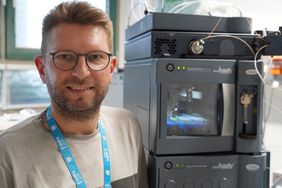Jena. As people age, the incidence of dementia increases, as does the risk of neurodegenerative diseases. An important hallmark of aging and aging-related neurodegeneration is the loss of protein homeostasis (proteostasis) and the dysfunction of cell organelles. Protein homeostasis refers to those cellular processes that protect the proteome - the ensemble of all proteins in a living organism - by regulating the synthesis, folding, and degradation of proteins within the cell. Disruptions in proteostasis can not only shorten a person’s lifespan, but also cause cells to age more rapidly and lead to the development of age-related diseases such as heart disease, diabetes, and neurodegeneration.
Processes in the aging brain
But how do disturbances to proteostasis lead to progressive dysfunction of organelles in neurons in the brain? Deciphering the relationship between the aging-related impairment of proteostasis and the maintenance of protein complexes and organelles in neurons is essential to better understand brain aging and to identify the molecular mechanisms responsible for neurodegeneration. To do this, it is necessary to quantify and comprehensively characterize the proteins in the cells and organelles. This is the only way to determine which chain of molecular processes triggers the loss of proteostasis and how this is mechanistically linked to the impairment of higher cellular functions.
“I hypothesize that defects in protein degradation that occur during aging negatively affect the fitness of neurons, and that protein complexes and organelles also exhibit different susceptibility to the age-related loss of function of protein degradation pathways,” reports Dr. Alessandro Ori, research group leader at the Leibniz Institute on Aging – Fritz Lipmann Institute (FLI) in Jena, Germany. Dr. Ori is an expert in the field of mass spectrometry-based proteomics. In his research, he integrates high-sensitivity mass spectrometry with other omics technologies and biochemical approaches.
From an idea to an innovative research approach
He has now been awarded an ERC Consolidator Grant for his new, innovative research approach. The approved “ComplexAge” project (on the vulnerability of protein complexes and organelles to protein degradation impairment in aging neurons) will be funded with 2 million euros over the next 5 years.
“To determine whether and which components of the proteome are more susceptible to defects in protein degradation, I plan to develop vertebrate models that allow to selectively inhibit specific protein degradation pathways in vivo in the organism and specifically monitor the effects on the proteome of neurons using quantitative omics approaches,” adds Dr. Ori. This work is being conducted in fish and mouse models as well as using special neurons derived from induced-pluripotent stem cells. Through the systematic quantification of protein localization and assembly status, the researchers aim to derive information about the effects of aging and aging-related impairment of protein degradation on the organization of the proteome - information that could not be determined solely by measuring protein abundance. Furthermore, the identification of assembly intermediates and mislocalized proteins could provide insight into the specific processes that are disrupted in aged neurons.
“The results of my future study may reveal new targets for therapeutic interventions aimed at maintaining neuronal fitness and delaying the onset of dementia in the elderly.”
About the researcher
Alessandro Ori completed his master’s degree in biotechnology at the Università di Bologna in Italy in 2006. During his studies, he completed a research internship at Université Paris Diderot. After receiving his PhD in 2010 from the University of Liverpool, UK, he worked as a postdoctoral researcher in the Structural and Computational Biology Unit research group at the European Molecular Biology Laboratory (EMBL) in Heidelberg, supported by Alexander von Humboldt and Marie Curie fellowships. Since September 2015, he has been a junior group leader at the Leibniz Institute on Aging - Fritz Lipmann Institute (FLI) in Jena. His research group “Aging of Protein Complexes” investigates how aging and environmental factors affect our organs at the molecular level. The group’s goal is to identify, as unbiasedly and objectively as possible, the changes in the proteome that lead to organ deterioration and affect a healthy lifespan.
In 2019, Dr. Ori was awarded the “Life Sciences and Physics” prize of the Beutenberg Campus Jena e.V. for his research results as the best young scientist.
ERC Consolidator Grant
The ERC Consolidator Grant is one of the most highly endowed funding programs of the European Union. With this grant, outstanding scientists receive funding to support them in the further expansion of their own research area and to enable them to carry out visionary basic research. The ERC Consolidator Grant comprises a grant of two million euros over a period of five years.
“I am very proud of this grant because it will dramatically accelerate our efforts to understand the causes of brain aging,” reports Dr. Ori. “I thank my lab members for their hard work, dedication, and creativity, and the FLI for the collaborative and supportive environment I am provided here.”
Contact
Dr. Kerstin Wagner
Press and Public Relations
Phone: 03641-656378, email: presse@~@leibniz-fli.de









